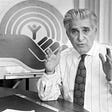High School & CNN+
A day after I learned my show was #1 on CNN+, I learned the streaming service was shutting down
Last week, No Mercy/No Malice won The Webby and People’s Voice Award for Best Business, News & Technology newsletter. Other nominees included newsletters from McKinsey & Co., The Washington Post, and The Skimm. This is meaningful for us. Thank you for reading, subscribing, and voting. 🏆👍
I returned to my high school in LA last week, the first time in 38 years — we shot an episode on education for my short-lived TV show. Walking down the hallway of your high school can trigger reward pathways in the brain, resulting in positive feelings of nostalgia. I was overwhelmed by this. They say people prone to sadness are more likely to feel intense feelings of nostalgia. So … yes.
The first wave of emotion hit me while walking past the trophy/award case — it hadn’t changed. I remembered the case decorated with the headshot of a student and flowers, not once but twice in the same month. Brent Alberts had rolled his Jeep, and Bobby Mitchells had been struck on his moped. Both died. Drunk driving and binge drinking were the tragedy and scandal at University High School in 1982. However, my best friend was Mormon, which was (mostly) a good thing, as I didn’t drink.
(Less Than) Great Expectations
I went in expecting to hear depressing stories of kids dropping out, struggling with depression, and not going to college. What I experienced was inspiring.
I met with Principal Claudia Middleton and college counselor Paula Van Norden, impressive women who made me feel optimistic about the future of our public high schools. I also met with Superintendent Alberto Carvalho who had been described as the LeBron James of the Miami-Dade school system before his tenure in LA. I met with the students — curious, ambitious kids who let me join them in the drumline — many underprivileged, some without a permanent home address. The important stats: 97% are graduating, and 92% are going to college. This. Is. Wonderful.
At the assembly, all the questions were a different flavor of the same query: What can we learn from your success, so we too can be successful? A: It began for me at Uni (high school). I ran for sophomore, junior, and senior class president, and I lost all three times. Based on that track record, I decided to run for student body president where I — wait for it — lost again. Amy Atkins turned me down for the prom, and I was cut from the baseball and basketball teams. Then I was rejected by UCLA, the only school I could afford to attend, as I could live at home.
However, I never lost my sense of enthusiasm. I appealed the rejection, UCLA admitted me, and by my senior year of college, I was president of the Interfraternity Council. Weak flex, I know, but it felt important at the time. I graduated with a 2.27 GPA, but that didn’t stop me from getting a job in the analyst program at Morgan Stanley (applied to 23 firms, one job offer) or getting into graduate school at Berkeley (applied to nine schools, rejected by seven).
In sum, the secret to my success is … rejection. Specifically, my willingness to endure it. Everybody knows failure, everyone will experience tragedy. You will get fired, make bad investments, and fall in love with someone who doesn’t love you back. Worst of all, someone you love, and who loves you a great deal, will get sick and die. A core competence of successful people is the ability to mourn, and move on.
So, how to develop this skill? People find strength and resilience in different places. For me, it’s atheism. I do not believe this is a dress rehearsal, and at some point I’ll look into my sons’ eyes and know our relationship is coming to an end. And that’s OK — I’m less afraid than most to risk public failure (starting businesses, making predictions, approaching strangers, etc.) because I believe this will all be over soon. In addition, age has given me the courage to be more forthcoming with my emotions. To tell people I love them, that I admire them. Looking at important decisions through the lens of your deathbed usually yields the same answers: Go for it, and tell people you love them.
NFLX
My friend Todd Benson says, “Market dynamics will always trump individual performance.” This is the Harvard Business School version of stoicism; focus on the things you can control. Last Wednesday night, I learned our show was the №1 weekly program on CNN+. Thursday morning, I was forwarded a New York Times article titled “CNN+ Shuts Down Weeks After Its Start.” In sum, when you’re killing it, try to maintain some humility. And when things haven’t gone well, forgive yourself. Much of your success and failure is not your fault. Your emotions are less a function of what’s happened than the variance. Perspective and gratitude are powerful Neosporin for disappointment. I know that for many people my worst day would be their best.
My show’s success was, to some extent, a function of luck — we were assigned a very talented team who could (often) turn chicken shit into chicken salad. That it was birthed on a platform that would experience SIDS … also (bad) luck. This is about to be a very bad time to be in streaming, regardless of your individual contribution. Netflix, the OG of streaming, is the tail wagging the dog. A dip for the giant was bound to send a chill through the market. But this is full-blown pneumonia.
In less than six months, Netflix has shed 70% of its value, or $215+ billion. Subscribers are churning, and the company is considering “New Coke” levels of risk to find revenue streams. For the first time, Netflix will have an ad-supported option. What I believe the market misses is Netflix does not have a subscriber problem, but a watcher problem — an estimated 611 million people watch Netflix, yet only 222 million subscribe. Securing the service (i.e., tightening password-sharing) is the right move, but polluting the streaming service with ads about opioid-induced constipation erodes a key point of differentiation.
What’s happening at Netflix suggests the current streaming model isn’t sustainable. The top U.S. streaming companies will spend $140 billion on content this year. There are 125 million households in America, and 90 million are likely streamable. So companies are spending $1.5k on your household to deliver Bridgerton and Euphoria, i.e., more than the average household’s credit card bill. Meanwhile, households are canceling their video subscriptions in record numbers. The most sustainable “streaming” platform might be TikTok, which spends $0 on original content (vs. Netflix’s $17 billion), and is free. The platform now commands more attention than Facebook and Instagram combined.
In the Red
In the face of this, CNN decided it wanted to get into streaming. And it made sense, as media firms are trapped in a multiple on EBITDA, marketing spend trap, unless they can bust a move to subscription. Trouble is, they were fighting Panzer tanks on horseback. People gasped at the reported $300 million budget of CNN+, but this meant the war was over before it started. Consider the math: For every dollar spent per month on CNN+ ($3/month), you received $100 million worth of content, vs. $1.7 billion on Netflix. Three hundred million dollars is what Netflix spends on a single season of Stranger Things.
Anger and Ego
Meanwhile, the guys moving boxes into the corner office (Discovery Inc.) were telling CNN not to do it. Despite this, they went ahead: CNN+ made its debut 10 days before Discovery’s merger with WarnerMedia closed. This was dumb … you don’t stick up the middle finger to your soon-to-be partners, much less your new owners. (I just read the last sentence, and it dawned on me that writing this post may also be … dumb. Anyway.)
On the morning of April 11, the first business day of new ownership, Discovery’s head of streaming called a meeting with CNN executives. His message: All CNN+ marketing is to be suspended. They initiated a formal business review, and the following week, CNN+ wasn’t just unplugged but smothered with a pillow. There’s no getting around it: The execs, staff, talent — all of us — look stupid.
The reflexive narrative has been “that’s what happens in media.” I run a small media company and have served on the boards of multibillion-dollar media firms. There’s no excuse for crass actions masquerading as decisiveness — this isn’t how you treat people. I’m not talking about the anchors cashing seven-figure checks (Chris Wallace will be fine), but the gaffer, sound-guy, editor, and camera operator. Discovery offered a solid severance package to the employees, but this doesn’t resolve the shitshow that is getting hired and fired within a month via the NYT. Shutting down CNN+ was probably the right call. But the whole thing reeks of anger and ego.
My Network
So, I’m back in high school, rejected again. But I have the perspective to know nothing is ever as good or as bad as it seems. I loved every second of the experience. The crew was great, and the show was good.
After we wrapped filming at my high school, I flew back to Florida. I checked my phone on the drive home — dozens of emails and texts checking in with me, asking if I’m alright, saying they liked the show … so nice. Yeah, I’m fine … I’ll mourn for a day, and then move on. See above: These are (really) good problems. I came home to the network that’s carried me for years.
The team does not show me the respect I deserve, rolls their eyes at my jokes, eats my socks, and the younger talent is especially difficult. The upside? The contract is for life, and we’re always there for one another.
Life is so rich,
P.S. Being a great boss is hard … but achievable. Enrollment for the Complete Manager Sprint closes on Tuesday.








